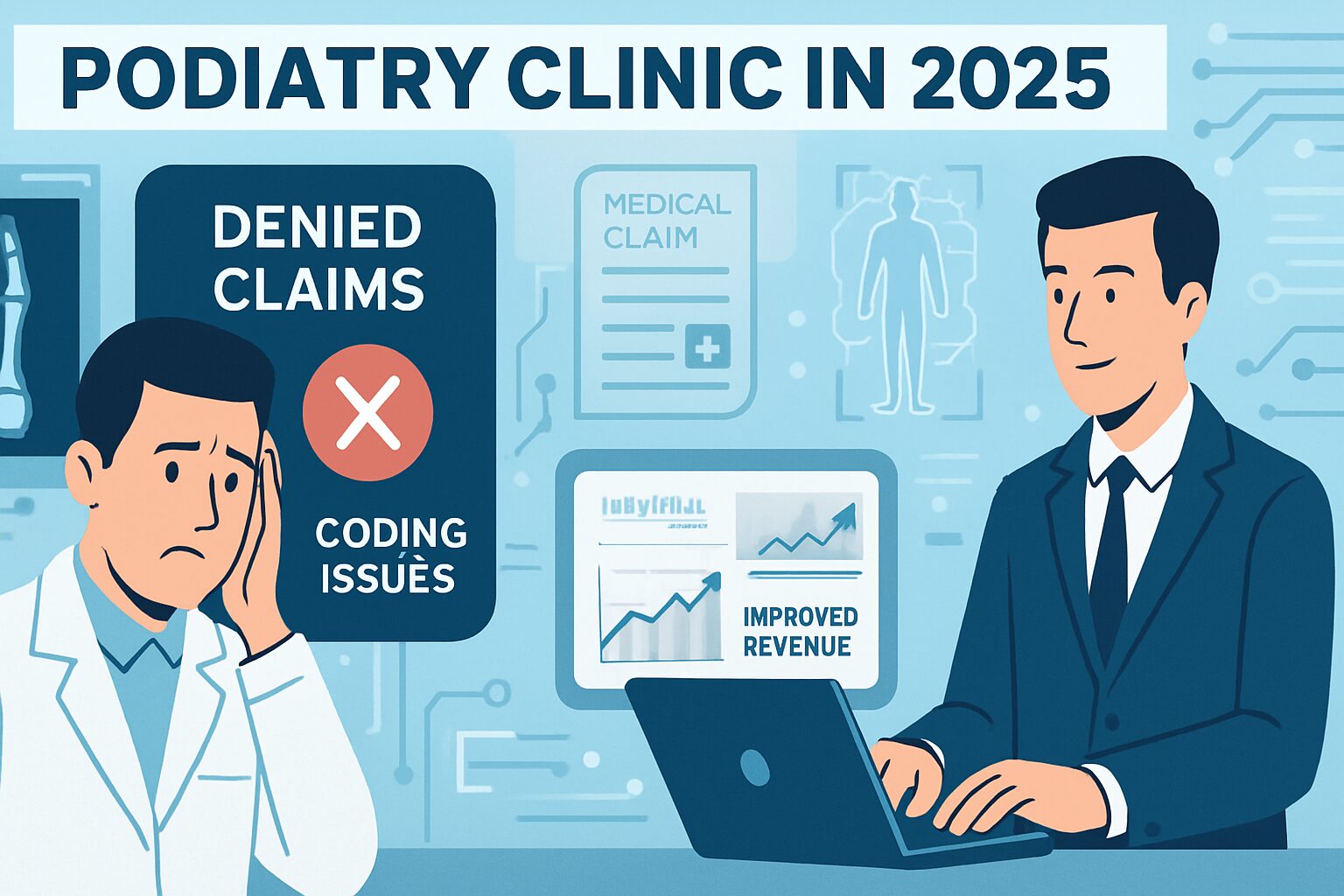If you’re managing a podiatry practice, hospital department, or SNF unit in 2025, you already know billing isn’t getting any easier. The rules change. Payers tighten requirements. Patients ask more questions. And somehow, you’re supposed to keep everything running without delays or denials.
Sound familiar?
Whether you’ve handled billing in-house for years or are just now considering outsourcing, this year has introduced some new (and frustrating) hurdles. Here are Common Challenges in Podiatry Billing, and how a reliable medical billing company can step in and make your revenue cycle easier to manage.
1. Coding Changes Aren’t Slowing Down
Podiatry billing is now more code-sensitive than ever. Between ICD-11 planning, Medicare policy updates, and expanded telehealth options, providers are constantly chasing code updates. On top of that, payers are heavily scrutinizing modifiers, especially for diabetic foot care and routine procedures.
One mistake, or an outdated code, can lead to a denied claim. And those denials add up fast.
What a Good Billing Partner Does:
- Keeps your coding 100% up to date with every CPT, ICD-10, and ICD-11 release
- Trains billing teams regularly and runs internal coding audits for accuracy.
- Flags modifier mismatches and coverage issues before claims go out
No more scrambling to keep up with changes. You get a partner who handles it for you.
2. Denials Are On the Rise—and They’re Hitting Hard
First-pass denial rates are creeping up, especially in specialties like podiatry, where payer rules are more complex. From missing authorizations to unclear documentation, payers are rejecting claims over details that used to get a pass.
If your team can’t keep up with denial workflows, you’re leaving money on the table.
How a Billing Partner Can Help:
- Verifies patient eligibility in real-time before appointments
- Handles pre-authorizations and payer-specific documentation requirements
- Has a dedicated denial management team that tracks, corrects, and resubmits claims quickly
Bottom line: Your claims get paid faster, with less back-and-forth.
3. Patients Are Confused About What They Owe
With high-deductible plans and shifting coverage rules, patients often don’t understand their financial responsibility until after they get a bill. That confusion leads to frustration, delayed payments, and sometimes even lost trust. Your front-desk staff shouldn’t have to be financial advisors, too.
How a Billing Partner Makes This Easier:
- Offers accurate cost estimates during scheduling, so patients aren’t surprised.
- Sets up flexible digital payment tools—text links, apps, or portals—to make payment simple
- Works with your practice to offer payment plans that fit patient needs
This not only improves collections, but it also improves patient satisfaction.
4. Manual Billing Still Slows Down a Lot of Practices
Not every facility has the budget or bandwidth for full automation. But manual processes are risky—more human error, slower claims, and staff burnout. If your billing team is stuck doing things the old way, it’s only a matter of time before something slips through the cracks.
What a Reliable Billing Company Brings to the Table:
- Pod-specific billing software that integrates with your EHR
- Automated code matching, eligibility checks, and claim scrubbing
- Flexible RCM systems that scale with your practice—even if you’re a small team
They bring the tools and the trained team, so you don’t have to build it all from scratch.
5. Cybersecurity Is Now a Revenue Issue
Data breaches are expensive—and not just in fines. One ransomware attack can freeze your billing process for weeks. With so much patient data being handled digitally, security can’t be an afterthought anymore.
A Professional Billing Partner Will:
- Use encrypted, HIPAA-compliant platforms to handle all data and claims.
- Regularly update systems and patch vulnerabilities.
- Monitor threats and protect your revenue cycle with tight security protocols.
You get peace of mind knowing your billing is safe, secure, and compliant.
Why This Matters
You didn’t go into healthcare to chase down denied claims or audit modifiers. But in 2025, the financial health of your podiatry practice depends on getting these things right—consistently.
That’s where a trusted medical billing partner comes in. Not just someone who submits claims, but a team that:
- Understands your specialty
- Keeps up with changing rules
- Strengthens your cash flow
- Protects your patient relationships
- And helps you avoid burnout from doing it all alone.
Looking for a billing partner who knows the ins and outs of podiatry?
We, at Rapid RCM Solutions, help practices across the U.S. streamline their billing, reduce denials, and boost revenue—without adding extra work to your plate.
Let’s talk about how we can support your team.
FAQs
Q1: How do billing partners help reduce claim denials?
A: Basically, a good partner brings in specialized coders, automatic ways to catch errors, and tools to double-check eligibility. They also have solid plans for when denials do happen. Together, that can often knock your denials down by 15% to 30%.
Q2: How quickly can I expect to see better collections and cash flow?
A: You should start to see better cash flow within about one to two billing cycles. This comes from getting set up efficiently, staying on top of denials, and just submitting all-around cleaner claims.
Q3: Is my patient data safe with an outside billing company?
A: Your data is secure only if the company follows HIPAA rules, uses encrypted systems, requires multi-factor logins, and conducts regular security checks. Make sure to ask about these safeguards beforehand.





